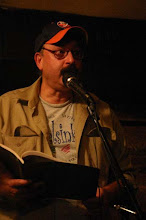At S21, Phnom Penh
My guide, whose family was taken by the Khmer Rouge, told me the day started when inmates stripped for inspection. They did what they were told. Arms behind their backs, legs raised to check for loose shackles. Questions answered without reflection. No one cried when flogged. Blows from a rifle butt met any complaints or backtalk. Constantly needing consent, even to roll over in a cell. “You’re not worthy of a bullet,” was drummed into their heads.
A glass case held three hundred skulls. According to my guide, they once formed a map of Cambodia. Bed frames and racks, where inmates had been whipped and tortured, lay rusting. In one room, thousands of photos of students, teachers, writers, doctors...all disappeared.
My guide, whose family was taken by the Khmer Rouge, told me the day started when inmates stripped for inspection. They did what they were told. Arms behind their backs, legs raised to check for loose shackles. Questions answered without reflection. No one cried when flogged. Blows from a rifle butt met any complaints or backtalk. Constantly needing consent, even to roll over in a cell. “You’re not worthy of a bullet,” was drummed into their heads.
A glass case held three hundred skulls. According to my guide, they once formed a map of Cambodia. Bed frames and racks, where inmates had been whipped and tortured, lay rusting. In one room, thousands of photos of students, teachers, writers, doctors...all disappeared.
Dominick Arbolay serves as Associate Editor for Mobius, The Poetry Magazine, and moderates the peer group workshop at the Poetry Society of America. He has published a chapbook of prose poems, The Phantoms, and is currently completing a series of stories about French writers that take place in 19th century Paris.
©Dominick Arbolay 2010






No comments:
Post a Comment